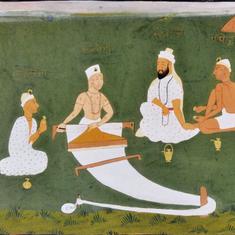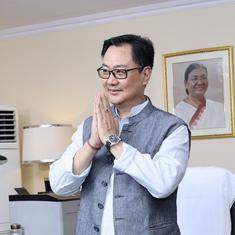Though World War II ended when Japan surrendered on August 15, 1945, most people don’t realise that the battles continued for a year longer. But this was not a fight against Japan. It was to reimpose European colonial rule over Asians using the British controlled Indian army.
“When Japan swept through Southeast Asia in 1942, it was a cause for celebration for many local inhabitants,” said Phil Craig, author of the recently released 1945 The Reckoning – War, Empire and the Struggle for a New World. “The Age of European empires had truly come to an end. The Asian powers had risen and that genie was not going back into the bottle.”
By mid-1942, Japan had occupied all Southeast Asia, mainly consisting of British, French and Dutch colonies, Craig said in an interview in a cafe near his home in London. Before the end of the war, Britain’s Fourteenth Army – two-thirds of whose soldiers were Indian – had already reconquered Burma. After Japan’s surrender in 1945, Britain easily reoccupied its colonies of Malaysia and Singapore..
However, France and Holland faced a much tougher situation. They were reeling from the five-year occupation of their countries by Nazi Germany. France was unable to deploy their armies to reoccupy French Indochina (today’s Vietnam, Cambodia, Laos). Holland faced a similar situation in the Dutch East Indies (today’s Indonesia).
But more importantly, the people of these Asian countries did not want them back.
But the British stepped in to wrest back control of these colonies for France and Holland. It used the British-controlled Indian army, which spent the next year fighting the local resistance in Vietnam and Indonesia.
Not only that, the British conscripted recently surrendered Japanese prisoners of war for the task. In an ironic twist, within weeks, Britain went from fighting Japanese soldiers to using them to fight its colonial wars.
“...Malaysia witnessed a 15-year conflict before becoming independent,” said Craig. “Unfortunately, Vietnam had to go through 30 years of war to finally become free.”
The second theme of Craig’s book is the juxtaposition of two men. One was the leading Indian politician Subhas Chandra Bose, who believed that Britain would never leave India unless it was forced out. This led him to seek the help of fascist Japan to fight for India’s freedom.
The other was Colonel KS “Timmy” Thimmaya of the Indian army, later to become the Chief of Army Staff. Thimmaya believed that India should fight with Britain to defeat fascist Japan and Germany and then claim its right to freedom. Though both were Indian nationalists, they found themselves on opposite sides.
In 1945 The Reckoning, Craig also explores a paradox: while Britain considered itself as the underdog standing alone in its fight against Hitler’s Germany, at the same time was a bullying “overdog” in its colonies. Many Asians were happy to see the British vanquished by Japan in 1942.
In an interview with Gautam Hazarika, Phil Craig spoke about why he wrote this book and what surprised him when he was researching it and more. Edited excerpts
What made you write this book?
My career in TV took me to my first book on World War II, The Finest Hour on the Battle of Britain that took place in 1940. Then came The End of the Beginning set in 1942, a turning point in the war, both co-written with Tim Clayton. After a long break of almost 20 years, I returned to writing to complete my trilogy on the war. I wanted to write a book about the end of the empire, more like the second one in the trilogy than the first.
A major theme of your book is the colonial world at the end of the World War II. What do you think about what happened?
I am proud of how Britain stood up to Germany during the war but was surprised to discover how short-sighted it sometimes was after World War II officially ended. I would even go so far as saying it was stupid.
The notion of empire being natural remained, and of Europeans guiding Asians and Africans. During the war, In French Indochina, the OSS [the United States’ Office of Strategic Services, the precursor to the Central Intelligence Agency] supported handing over power to the Vietnamese leader Ho Chi Minh despite him being a communist as he was a friendly ally.
So far, colonial powers had held together disparate locals, perhaps through a policy of divide and rule. If they were to pass on the reins to someone in a diverse country, he was the best choice as he had an army and was popular in both North and South Vietnam. [The wartime US President FD] Roosevelt did not want to hand back the colony to France and supported this, as mentioned in the diaries of Field Marshall Alanbrooke [the chairman of the British Chiefs of Staff Committee]. He was very much against the colonial world.
But Roosevelt had died in April 1945, and the coast was clear. When the war ended in August, the French and Dutch, ravaged by the wartime Nazi occupation, were unable to take back control of their colonies. The British Prime Minister Attlee [who had succeeded the wartime leader Winston Churchill] agreed to do it for them.
The Indian troops used for this fought against the Viet Minh and Indonesians till 1946. On the ground as there were insufficient troops, even Japanese POWs joined the fray, which seemed to surprise even some academics.
So, the war did not end on VJ [Victory against Japan] day, August 15, 1945. Instead other conflicts emerged and solidified.
What made you juxtapose Subhash Chandra Bose and Thimmaya?
A major part of the book is what happened in India. I wanted to write about Bose who is so well known there, yet so little known in Britain. He was taken by the messianic glamour of men who got things done.
In Berlin in 1941-’422 at the height of Nazi power, he saw the model of a paramilitary state and saw himself in that role, as a prophet and a leader. Bose was also very philosophical, as seen in his book An Indian Pilgrim, written like a model for a life. He was very talented and brilliant, and even when battles were being lost, his men admired him. Had he made different choices Bose might have been the benevolent dictator he wanted to be.
I wanted another side and came across Colonel Thimmaya, or Timmy as he was known. With a strong attachment to the Indian army, he did not change sides. He saw the British at their best and their worst. Motilal Nehru [the father of India’s first prime minister] advised him to remain in the army as India would need trained and loyal officers soon. So, he stayed, but didn’t send his men to shoot Indian protestors.
In the early years of the war, he said Indians rejoiced at Britain’s defeats in Europe. He was endearingly funny, brave, brilliant, had a prickly temper, and knew he had one. Timmy had a bittersweet love hate relationship with the army. I feel I got to know him well, as one does when writing about a person.
How did this interesting word you have coined “overdog” come about?
Britain thought of itself as the underdog in its fight with Hitler, weaker and standing alone. But it was neither. In many key respects the RAF’s Fighter Command was stronger in 1940 than the Luftwaffe forces it confronted, and of course the Royal Navy commanded the seas. And Britain was never truly alone as it had the strength and resources of the empire behind it.
At the same time, Britain was historically something of a bully in its colonies, hence the term “overdog”.
Why did you choose the title The Reckoning?
I wanted it to be a better version of “Compromised Victory”. I am proud of what Britain did during the war but recognise that after the war our actions were not always laudable or wise. The Reckoning means it’s a balanced assessment, considering both sides. The good and the bad are inseparable and I did not want to duck the issues.
For you, what was the best part of the book?
I love my nurse, Angela Noblet. She came from Britain to India in the period covered by my book and her diary vividly describes the India she saw – the Indians, the Britons, and most of all herself. She was very modern for her time, had an appealing vision of the future even if perhaps naïve. She had an open heart and spirit and was an embodiment of the nicer side of British character. I am a little bit in love with her.
She was furious how the men she liked on the ship to India changed as soon as they landed, behaving condescendingly towards the Indians. Her diary was sensational. Wanting to introduce each story with a personal story, the Bengal famine enters the book through her words for example, when she was appalled seeing so many people begging for food.
Gautam Hazarika is a Singapore-based author. His book The Forgotten Indian Prisoners of World War II is being published by Penguin India and Pen & Sword UK later this year. He can be contacted at ghazarika70@yahoo.com.sg.










